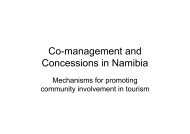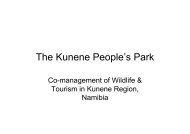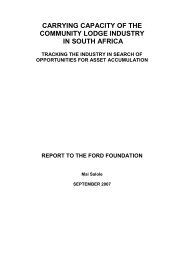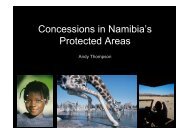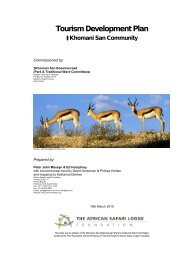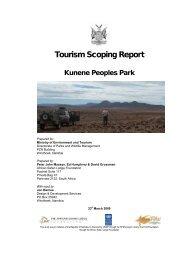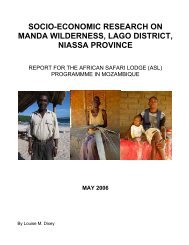Evaluating outcomes at Madikwe and Makuleke by Peter John Massyn
Evaluating outcomes at Madikwe and Makuleke by Peter John Massyn
Evaluating outcomes at Madikwe and Makuleke by Peter John Massyn
Create successful ePaper yourself
Turn your PDF publications into a flip-book with our unique Google optimized e-Paper software.
1. INTRODUCTIONTourism enterprises based on Africa’s n<strong>at</strong>ural <strong>at</strong>tractions – including smallaccommod<strong>at</strong>ion establishments widely known as ‘safari lodges’ – are today generallyregarded as important drivers of development, particularly in remote areas with richresource endowments but few other formal economic opportunities 1 . There is a plethora ofd<strong>at</strong>a indic<strong>at</strong>ing th<strong>at</strong> the rural poor in these areas already benefit from the tourism market,mainly as sellers of labour to safari lodges. 2 But the involvement of the poor is curtailed <strong>by</strong>a number of factors. In rural African settings – often characterized <strong>by</strong> a shortage of skills,insecure l<strong>and</strong> rights <strong>and</strong> a high degree of informality – external interests typically capturea large proportion of the benefits gener<strong>at</strong>ed <strong>by</strong> the tourism market. The local poor oftenprovide only unskilled labour with outside suppliers meeting the industry’s otherrequirements. These include factor inputs in the form of l<strong>and</strong>, capital <strong>and</strong> skilled labour aswell as various intermedi<strong>at</strong>e goods <strong>and</strong> services. This results in a skewed distribution ofreturns th<strong>at</strong> does little to support social <strong>and</strong> economic advancement in the remote ruralareas where the tourism destin<strong>at</strong>ions are loc<strong>at</strong>ed. 3Simply promoting tourism growth in underdeveloped settings is clearly not a guarantee ofsustainable advances for the poor <strong>and</strong> disadvantaged of such regions. This poses animportant challenge to policy makers, local residents, the priv<strong>at</strong>e sector, donors <strong>and</strong>development practitioners: to devise str<strong>at</strong>egies th<strong>at</strong> simultaneously promote market-ledtourism growth <strong>and</strong> enhance the capacity of the local poor to benefit from th<strong>at</strong> growth.Recognising th<strong>at</strong> wages are a key source of revenue flow, several developmentinterventions have <strong>at</strong>tempted to improve the integr<strong>at</strong>ion of the poor <strong>by</strong> building the skillsthey are able to offer the industry, there<strong>by</strong> positioning them to capture a gre<strong>at</strong>erproportion of the more lucr<strong>at</strong>ive employment opportunities cre<strong>at</strong>ed <strong>by</strong> the tourism market.1 Certain comment<strong>at</strong>ors, while recognising the important potential of tourism in certain localities, havecautioned against excessive expect<strong>at</strong>ions pointing out th<strong>at</strong> tourism is not a development panacea: “Theextent to which the tourism industry can fulfil these expect<strong>at</strong>ions is questionable: in terms of its overallpotential for expansion, the distribution of th<strong>at</strong> potential <strong>and</strong> the pronounced constraints facing theindustry.” The ComMark Trust, 2005: 17.2 See, for example, <strong>Massyn</strong> <strong>and</strong> Koch, 2004; <strong>Massyn</strong> <strong>and</strong> Koch, 2005; <strong>and</strong> Poultney <strong>and</strong> Spenceley, 2004.3 “In the tourism sector, n<strong>at</strong>ional governments <strong>and</strong> donors have generally aimed to promote priv<strong>at</strong>e sectorinvestment, macro-economic growth <strong>and</strong> foreign exchange earnings, without specifically taking the needs<strong>and</strong> opportunities of the poor into account in tourism development. Donor-supported tourism master plansoften focus on cre<strong>at</strong>ing infrastructure, stimul<strong>at</strong>ing priv<strong>at</strong>e investment <strong>and</strong> <strong>at</strong>tracting intern<strong>at</strong>ional tourists.Investors are often intern<strong>at</strong>ional companies <strong>and</strong> local elites, whose profits are generally rep<strong>at</strong>ri<strong>at</strong>edabroad or to metropolitan centres. Links with the local economy are often weak, with the possibleexception of employment.” Ashley et al, 2000: 1-2./4



